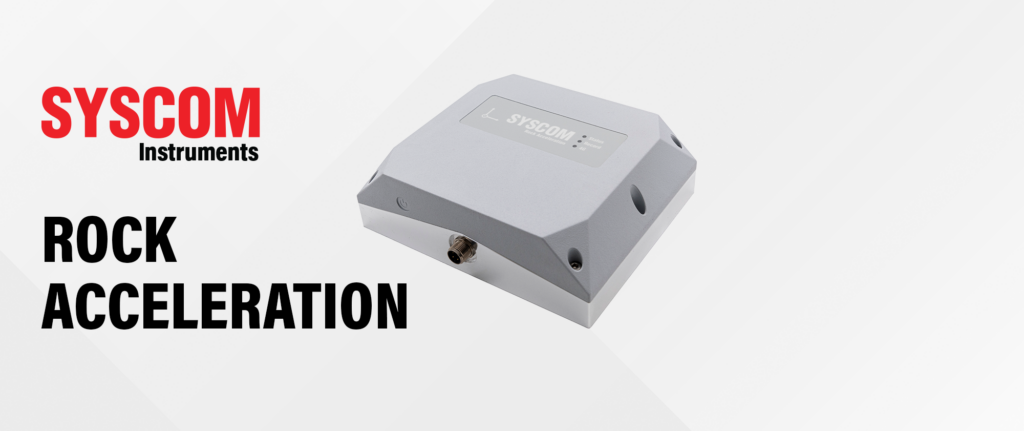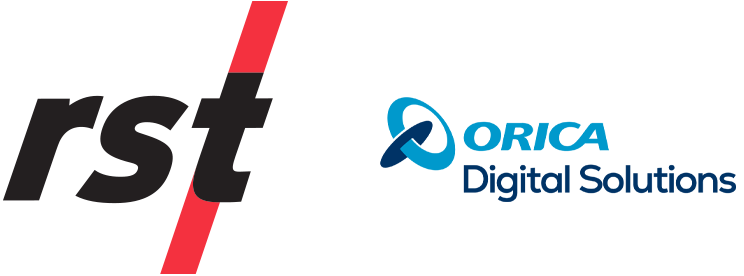Posts by Category
Recent Posts
- In focus: RSTAR Affinity Tilt Logger
- How to Solve Dynamic Structural Health Monitoring Challenges with ROCK Acceleration
- RST Instruments joins leading names in monitoring: Introducing Geosolutions
- Leveraging ShapeArray for wireless automated remote deformation monitoring
- United under Orica Digital Solutions, Terra Insights and GroundProbe merge geotechnical technologies and capabilities
- Terra Insights joins Orica, expanding digital solutions platform
As global infrastructure continues to age, the urgency for innovative solutions in structural health monitoring (SHM) rises. To meet and support this timely need, Syscom Instruments proudly introduces our new ROCK Acceleration device, a groundbreaking tool for enhancing the safety and longevity of critical structures.
This all-in-one solution, paired together with the Syscom Cloud Software (SCS), delivers an unmatched user experience and the quickest ROI for data-driven structural assessment.

What is Structural Health Monitoring?
Structural health monitoring (SHM) involves the use of various strategies and technologies to assess the condition of structures in near real-time, ensuring they continue to operate safely and efficiently.
SHM is crucial for the early detection of damage, optimizing maintenance operations, and extending the lifespan of infrastructure assets. This proactive approach becomes especially vital in monitoring aging bridges, buildings, and other civil structures at elevated risk of failure.
Introducing the ROCK Acceleration Device
Within the realm of civil and structural engineering, Syscom Instruments are long-time leaders in providing vibration and seismic monitoring technology. Our latest offering, the ROCK Acceleration was developed with the specific challenges of dynamic structural health monitoring in mind.
This innovative device is available in two models, designed to cater to different monitoring needs and ensure high reliability and accuracy:
- Standard SHM Model: Ideal for general structural health monitoring, this model features a self-noise level of 25 μg RMS/√Hz, making it suitable for continuous, long-term monitoring projects.
- High-Sensitivity OMA Model: Designed for Operational Modal Analysis (OMA), this model boasts an ultra-low self-noise of 0.2 μg RMS/√Hz, which is essential for detecting subtle structural vibrations and dynamics.
Both models are robust, housed the same style of compact unit. Each comes equipped with a triaxial acceleration sensor, a digital recorder, and integrated communication capabilities.
Together, this functionality ensures swift, gateway-free data transfer and notifications to facilitate the system’s ease of use and reliability.
Key Features
Cable-Free Operations
ROCK Acceleration functions autonomously, powered by an internal battery that lasts for several months. For longer operations, the device can be linked to a compact solar panel, making it adaptable for both short-term and long-term deployments.
Integrated Connectivity
Equipped with built-in LTE-M connectivity, a SIM card, and GNSS features, the ROCK Acceleration tool ensures dependable data transmission. No external gateways required. This setup allows for immediate data transfer and accurate time synchronization (<10 μs) across various units.
Ease of Installation and Use
Streamlining the installation process, ROCK Acceleration delivers auto-orienting and self-leveling capabilities. Upon deployment, the device connects to Syscom Cloud Software (SCS), facilitating remote configuration and data retrieval.
Its user-friendly, plug-and-play design greatly reduces the time and effort required, from initial installation to its future maintenance.
Robust Data Processing
Syscom Cloud Software (SCS)—which the ROCK Accelation must be connected to—handles data processing, allows for remote setting adjustments on devices, and delivers automated reports and alerts.
A versatile cloud platform, SCS accommodates several recording modes, including timed, trigger, and background, to meet diverse monitoring requirements.
Applications and Benefits
As an SHM solution, the ROCK Acceleration is highly adaptable and can be leveraged across various sectors to monitor the health and performance of structures:
- Bridges and Buildings: Enables continuous monitoring of vibrations to identify early signs of structural problems and avert severe failures.
- Wind Towers: Evaluates the dynamic response of wind turbines to guarantee their stability and efficiency.
- Electrical Substations: Monitors vibrations and other core parameters to uphold the integrity and dependability of power infrastructure.
- Geotechnical Investigations: Provides crucial data on ground vibrations and structural interactions during geotechnical evaluations.
When paired with the SCS platform, ROCK Acceleration offers a comprehensive solution for dynamic structural health monitoring. The device’s main advantages include:
- Remote Monitoring: Provides nearly real-time data access and remote configuration capabilities, reducing the necessity for frequent on-site visits.
- Cost Efficiency: Minimize maintenance costs via the device’s extended battery life and optional solar panel connectivity.
- Scalability: Suitable for both minor and major monitoring endeavours due to its self-sufficient operation and strong connectivity options.
- Accuracy: Features high-precision time synchronization and low-noise sensors that deliver dependable data for precise structural evaluations.
In sum, Syscom Instruments’ ROCK Acceleration holds considerable benefit for modern SHM. It provides much-needed functionality for protecting and fortifying the safety of critical global infrastructure.
Enhance Your SHM Projects with Syscom Instruments
Discover the future of structural health monitoring with Syscom Instruments’ ROCK Acceleration device. Contact our team today to explore how our SHM technology can enhance the safety and resilience of your vital infrastructure. Let’s build a safer, more sustainable future together.
Speak with an Expert
I’m very happy with the quality of the instrumentation and technical support from RST, as always. They worked with us from the initial stages of the project to ensure that we were fully prepared and equipped to use the RSTAR network for the first time. They delivered everything within the tight project time frame to ensure that there were no delays on site, and the submersible tilt meters looked like new even after over twelve months of being submerged in Thames water!
-Richard Lipscombe, BEng (Hons), Director & Principle Consultant - RL Geotechnical Ltd
Related Posts
In focus: RSTAR Affinity Tilt Logger
Introducing the RSTAR Affinity Tilt Logger. Developed by our team of instrumentation exper...
ShapeArray Fundamentals in 2023: Your questions answered
Measurand’s Mitchell Pollock and Terra Insights’ Josh Smith presented ShapeArray™ Fu...
Meet RSTAR Affinity
Critical asset data at your fingertips Designed by RST’s team of instrumentation experts...







